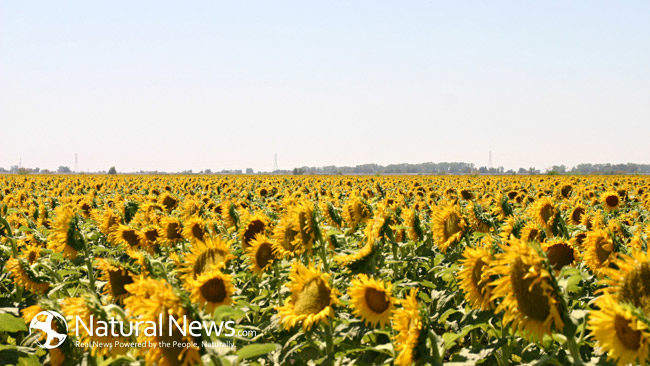Use of depleted uranium in Ukraine sparks concerns about food safety
The US is now sending depleted uranium munitions to Ukraine, following the lead of Britain which began sending the same to Ukraine earlier this year. Depleted uranium is a very dense, heavy metal capable of piercing armor. Like other heavy metals, it can negatively impact human health [10]. In addition, depleted uranium is radioactive and its use in warfare has long been contested.
A battlefield strewn with depleted uranium shrapnel and dust will remain radioactive long after the conflict ceases. This contamination presents an ongoing threat to the health of the people living wherever that battlefield may be. In the case of the Ukraine, that battlefield also happens to be the breadbasket of Europe.
Sunflower oil: Ukraine’s liquid gold
Ukraine is a major exporter of wheat, corn, barley and rapeseed (i.e. canola). However, Ukraine’s top agricultural export is sunflower oil. As of 2021, 46% of global sunflower oil exports came from the Ukraine [2]. Sunflower oil comes from sunflower seeds. It is popular for baking and frying. Sunflower oil is an ingredient in many prepared foods and personal care products. It is high in Vitamin E. In some cases, Vitamin E is extracted from sunflower oil [1].
Sunflowers accumulate uranium
Interestingly, sunflowers plants are known to absorb uranium from their environment and concentrate it in their tissues. For this reason, sunflowers are planted to clean up environmental uranium contamination [5]. In fact, the sunflower is the international symbol of a world free of nuclear weapons. However, sunflowers used in remediation efforts should not be consumed by humans or animals.
While the war in Ukraine has impacted agricultural production and exports, the Ukraine continues to be a major exporter of grains and sunflower oil. Barley and winter wheat are typically harvested in early to mid summer. Spring wheat and sunflowers are generally harvested starting in late summer or early fall. We are currently in the midst of the first harvest of Ukrainian sunflowers that may have been exposed to depleted uranium.
Fortunately, most of the uranium absorbed by sunflowers stays in their roots. According to a 2010 study in the Journal of Hazardous Materials, only 3% of the uranium absorbed by a sunflower plant will be found in its above ground parts, including the seeds [5]. Of course, even a small fraction of the total uranium a sunflower absorbs from heavily contaminated soil could still be a level unsafe for human consumption.
Of note, Jerusalem artichokes (aka sunchokes) are a type of perennial sunflower with edible roots. In this case, the roots are the food crop rather than sunflower seeds. So if those roots were grown in soil contaminated with depleted uranium, approximately 97% of the absorbed uranium would be in the portion of the plant that could end up on someone’s dinner table.
Scientists have also studied the ability of beans to absorb uranium and found them to be effective [5,6]. Therefore, beans grown in uranium rich soil would likewise be at high risk of contamination. Beans are not among Ukraine’s top exports although wartime conditions have led an increasing number of farmers to plant soybeans rather than corn.
The Precautionary Principle
The Precautionary Principle is a set of guidelines applied in environmental science [3]. It aims to protect human health and the environment. This principle urges caution and preventive measures wherever the potential for harm exists. It is a call to action rather than a permissive acceptance of pollution. It is similar to the medical principle of “First do no harm.”
Just as concerns about dioxin contamination affect the farms surrounding East Palestine, Ohio, concerns about depleted uranium contamination affect the farmland of Ukraine. This contamination could be expected to impact farms sporadically. In the midst of war, we lack data on which farms are affected. We don’t yet know what levels of uranium contamination are present in the foods they produce. Yet even in the absence of such data, the Precautionary Principle requires us to act in a way that protects human health.
A ceasefire, or at least a ban on the use of depleted uranium munitions, would be the first step in correcting this problem. Next, testing would be needed to determine those sites contaminated by uranium. Ultimately, sunflowers may play a role in healing the land, but only as part of a comprehensive remediation strategy. Until then, it would be prudent to exercise caution in consuming agricultural products from Ukraine, particularly sunflower oil.
References
- Eden Botanicals. Vitamin E Oil – Tocobiol® SF. Eden Botanicals. 2023 https://www.edenbotanicals.com/vitamin-e-oil.html
- Feingold, S. Ukraine’s food exports by the numbers. World Economic Forum. July 25 2022. https://www.weforum.org/agenda/2022/07/ukraine-s-food-exports-by-the-numbers/
- Kriebel D, Tickner J, Epstein P, Lemons J, Levins R, Loechler EL, Quinn M, Rudel R, Schettler T, Stoto M. The precautionary principle in environmental science. Environ Health Perspect. 2001 Sep;109(9):871-6. doi: 10.1289/ehp.01109871. PMID: 11673114; PMCID: PMC1240435.
- Krieger, D. Sunflowers: The Symbol of a World Free of Nuclear Weapons. Nuclear Age Peace Foundation. March 12 1998. Last updated August 24 2015. https://www.wagingpeace.org/sunflowers-the-symbol-of-a-world-free-of-nuclear-weapons/
- Lee M, Yang M. Rhizofiltration using sunflower (Helianthus annuus L.) and bean (Phaseolus vulgaris L. var. vulgaris) to remediate uranium contaminated groundwater. J Hazard Mater. 2010 Jan 15;173(1-3):589-96. doi: 10.1016/j.jhazmat.2009.08.127. Epub 2009 Sep 1. PMID: 19783370.
- Naeem H, Bhatti HN, Sadaf S, Iqbal M. Uranium remediation using modified Vigna radiata waste biomass. Appl Radiat Isot. 2017 May;123:94-101. doi: 10.1016/j.apradiso.2017.02.027. Epub 2017 Feb 20. PMID: 28260611.
- Reliefweb. Ukraine: Sunflower Oil Production (October 2022). OCHA Services. January 18 2023. https://reliefweb.int/report/ukraine/ukraine-sunflower-oil-production-october-2022
- Singh, S. Kesavan, M. INTERVIEW: Ukraine farmers switching to beans from corn on export headwinds: agribusiness club. S&P Global Commodity Insights. May 24 2022. https://www.spglobal.com/commodityinsights/en/market-insights/latest-news/agriculture/052422-interview-ukraine-farmers-switching-to-beans-from-corn-on-export-headwinds-agribusiness-club
- Stone, M. Exclusive: US to send depleted uranium munitions to Ukraine. Reuters. September 5 2023 https://www.reuters.com/world/us-send-its-first-depleted-uranium-rounds-ukraine-sources-2023-09-01/
- UK Health Security Agency. Depleted uranium (DU): general information and toxicology. UK Government. December 17 2007. https://www.gov.uk/guidance/depleted-uranium-du-general-information-and-toxicology





